 By Dan Fournier
By Dan Fournier
Introduction
There is no doubt, war is ugly. Atrocities are committed by all belligerents involved in conflict.
Propaganda is heightened and intensified not only by the major participants, but also by countries, governments, organisations, corporations, and individuals who aren’t directly involved in the conflict. Each has their own motivations, reasons, and self-serving interests for doing so.
Fog of war – a German expression Nebel des Krieges coined by Prussian general Carl von Clausewitz – is often used to describe the uncertainty in situational awareness experienced by participants in military operations.
The expression can also easily be used to describe the fog that occurs between people’s ears when they are bombarded with propaganda pushed by countless parties which most often completely distorts the true realities of the conflict or war in question.
War is emotional. And when emotions are high and people are gaslighted, reason and judgement are often easily thrown out the window.
The absence or omission of truthful information and picking sides also contributes to a lack of balanced reporting on such conflicts.
Too often, the very powerful mainstream press is incentivised to report a prevailing narrative that, more often than not, serves the vested interests of those to whom they are all too willing to oblige their allegiances to.
Journalists and independent or alternative media outlets that provide reporting that is counter to these prevailing narratives are often labelled as conspiracy theorists or other derogatory labels.
This is done so because those who are attacking them cannot counter the merits of their claims and reporting, and thus must resort to attacking their character instead.
Unfortunately, this is a logical fallacy that most of the general public fall for.
Now for the ugly, inconvenient, truths that the mainstream media refuse to present to their audiences with regards to the Ukraine and the Russia-Ukraine war.
1. NATO’s expansion towards Russia’s borders
For those not entirely familiar with NATO, or the North Atlantic Treaty Organization, here is a nice summary by Al Jazeera:
“The North Atlantic Treaty Organisation (NATO) was founded in 1949 by 12 member states – Belgium, Canada, Denmark, France, Iceland, Italy, Luxembourg, the Netherlands, Norway, Portugal, the United Kingdom and the United States – and was established to curb Soviet expansion and encourage political integration in Europe in the aftermath of World War II.
The 30-member alliance is meant to guarantee political and military protections, and allow European and North American nations to discuss security concerns.”
One of the main reasons for its existence was to “curb Soviet expansion”, as stated above. The rationale being that the West viewed the Soviet communist system as a grave threat after World War II.
Moreover, as the Soviet Union and the United States were embroiled in the Cold War from 1947 to 1991, the U.S. sought to expand its sphere of political and military influence, particularly in Europe.
After the Dissolution of the Soviet Union in 1991, 15 former Soviet Republics became sovereign states.
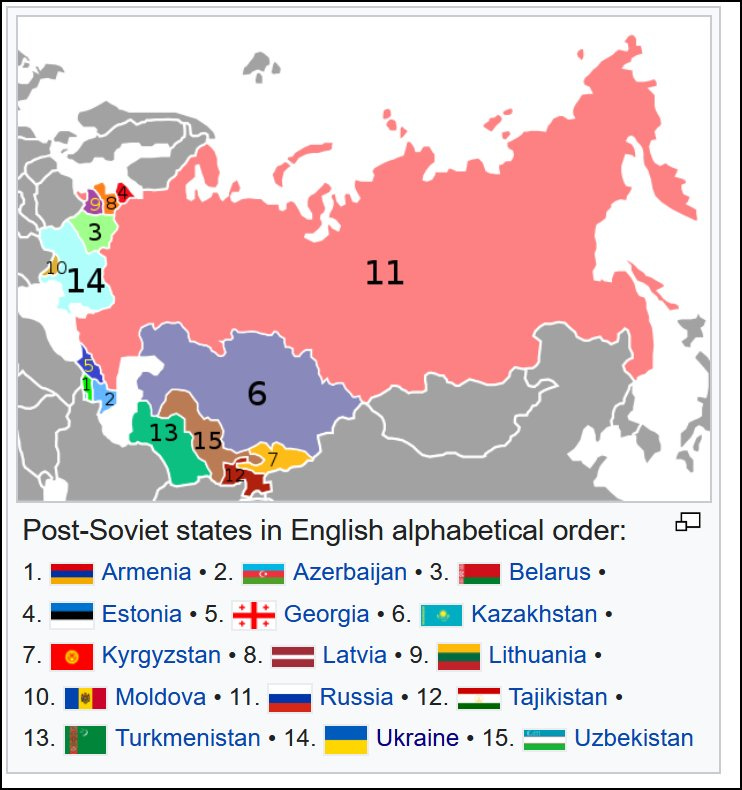
Fifteen post-Soviet states. Source: Wikipedia.
Though many of these states as well as their people have retained close ties with Russia, three of them acceded membership into NATO in 2004; namely, Estonia, Latvia, Lithuania.
Two of these countries, Estonia and Latvia share a border with Russia.
Recall that NATO originally had 12 members.
A CNBC article provides two maps showing the expansion of NATO since 1991 towards Russia. The first map shows Europe in 1990, the year after the Berlin wall fell:
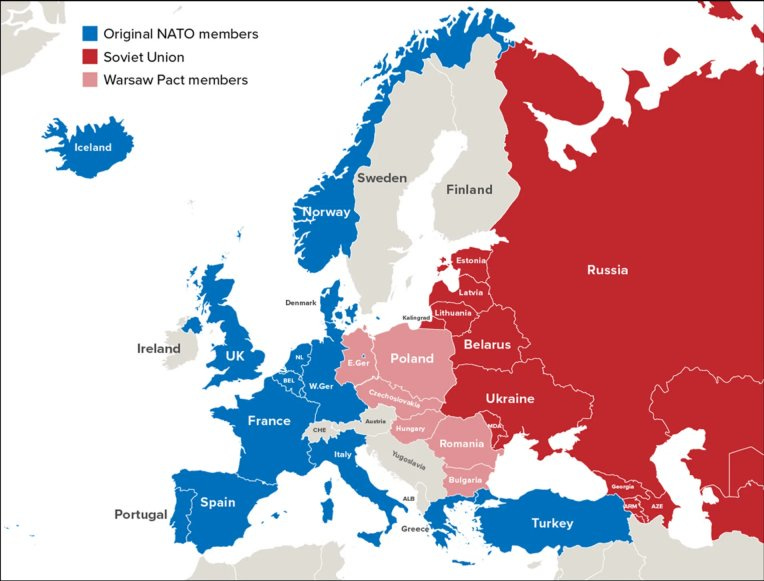
Map of Europe in 1990 showing original NATO countries in blue. Source: Bryn Bache, CNBC.
Their second map, as of 2022, clearly shows the expansion of NATO membership over the past 32 years since the reunification of Germany:
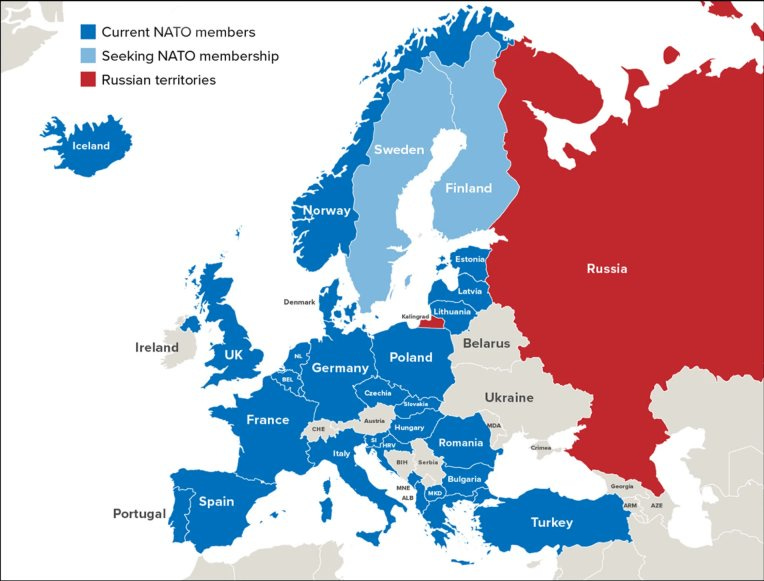
Map of Europe in 2022 showing current NATO countries in blue. Source: Bryn Bache, CNBC.
From this second map above showing 2022 NATO countries in blue, we can also notice Sweden and Finland (in light blue) who are currently vying for NATO membership.
Since the early 1990s, Russia has been worried about NATO expanding closer to its borders.
While various agreements had been made between Russia and Europe not to expand NATO eastward, several of them were broken.
The main worry is that NATO members can have military bases that hold nuclear missiles for which member countries, such as the United States, have an ample supply of.
There is plenty of evidence that confirms that such military bases (particularly from the U.S. and NATO) exist and are located in Russia’s immediate neighbors of Estonia (see also here, here and here), Latvia (see also here, here, here, here, here, here, and here) , and Lithuania (see also here, here, here, here, and here).
U.S. and NATO military bases, personnel, and operations are not limited to these three countries, for there are many more in other NATO countries near Russia such as Poland, Hungary, and Bulgaria.
In recent years, Russian President Vladimir Putin has sought guarantees from NATO and many of its European members that it would halt its eastward expansion and end military cooperation with Ukraine and Georgia, which are not members, observed Al Jazeera.
Both Georgia and the Ukraine share borders with Russia and the latter has a significantly long border with the biggest former member of the Soviet bloc.
It would thus come as no surprise that Russia and its current leader, Vladimir Putin, would consider it more than hostile should either of these two countries were to join NATO.
Many of sound mind would argue that having military bases, some with nuclear arsenals, within only several kilometers from your doorstep poses a significant threat to the safety, protection, and territorial integrity of a nation and its people.
Was this not the case when the Soviet Union had stationed nuclear missiles in Cuba, less than 100 miles away from the United States?
If that was not acceptable to President John F. Kennedy and the U.S. administration, then how is it different for Vladimir Putin, the President of Russia and his administration?
Should they not be granted the same right?
These questions must be considered and contemplated prior to outrightly accusing Putin of “aggression” and invasion against the Ukraine, or any other close neighbor, for that matter.
Also according to the Al Jazeera article, in February [of 2022], Putin said Russia’s “special operation” in Ukraine was a means to stop NATO’s growth, which he perceives as an encroachment.
Only in recent weeks has Putin called the conflict with the Ukraine a war. Perhaps this is so because he had not anticipated the level and extent of Western support Kiev has received over the past year.
While some would argue that the invasion was nevertheless unjustified, ample evidence exists that show that prior promises and agreements to not allow the expansion of NATO eastward were broken by NATO members and NATO itself.
Here are but two of these broken promises which most everyone seems to forget about.
Early last year, a secret document from March 1991 titled QUADRIPARTITE MEETING OF POLITICAL DIRECTORS, BONN, 6, MARCH: SECURITY IN CENTRAL AND EASTERN EUROPE showed a pledge to Moscow by the United States, Germany, France, and the United Kingdom, that they would not extend NATO eastward and would not offer membership to Poland.
The document was found in the UK National Archives by Joshua Shifrinson, a political science professor at Boston University in the US and shared with Der Spiegel. It had been marked “Secret” but was declassified at some point.
Specifically, here is part of what was it stated:
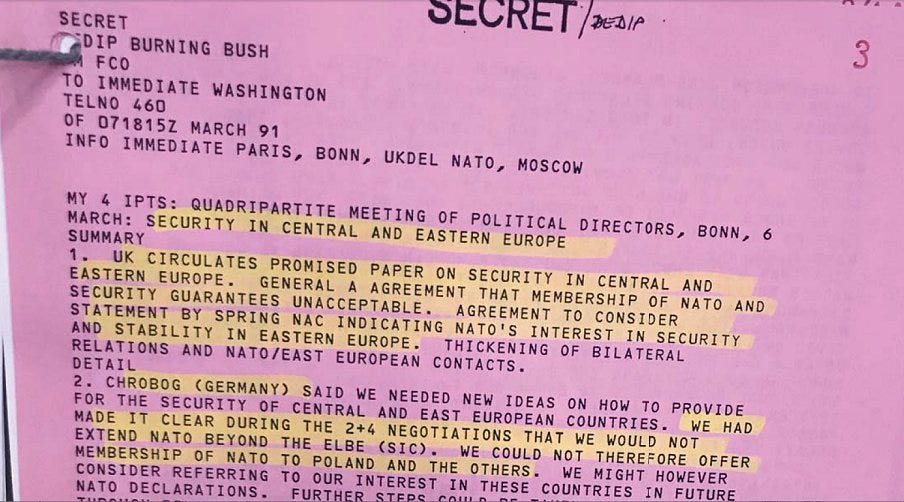
Screenshot of the 1991 QUADRIPARTITE MEETING OF POLITICAL DIRECTORS, BONN, 6, MARCH: SECURITY IN CENTRAL AND EASTERN EUROPE. Source: UCLA College of Social Sciences.
As the reader may notice from the image above, the parties stated: “WE HAD MADE IT CLEAR DURING THE 2+4 NEGOTIATIONS THAT WE WOULD NOT EXTEND NATO BYOND THE ELBE (SIC).”
The “2+4 negotiations” simply refers to the reunification of Germany (i.e., East Germany with West Germany) with NATO remaining an integral part of the reunified country.
In July 2014, NATO itself called the eastward expansion a “myth,” as per its published piece titled NATO enlargement and Russia: myths and realities. In that piece, a few questions were raised about the “enlargement conundrum” [emphasis added]:
“Does the absence of a promise not to enlarge NATO mean that the West never had any obligations vis-à-vis Russia? Did the enlargement policy of Western institutions therefore proceed without taking Russian interests into account? Again, the facts tell a different story.”
The only thing is, NATO was not counting on the QUADRIPARTITE MEETING OF POLITICAL DIRECTORS, BONN, 6, MARCH: SECURITY IN CENTRAL AND EASTERN EUROPE secret document to be released to the public.
In black and white, it confirms that a promise, or agreement, by NATO not to expand did take place.
So, this myth, or “conspiracy theory” turned out to be conspiracy fact.
It is no wonder that Moscow and Putin hold a fervent distrust of NATO, the United States, and its other Western allies.
The secret 1991 document also revealed the following:
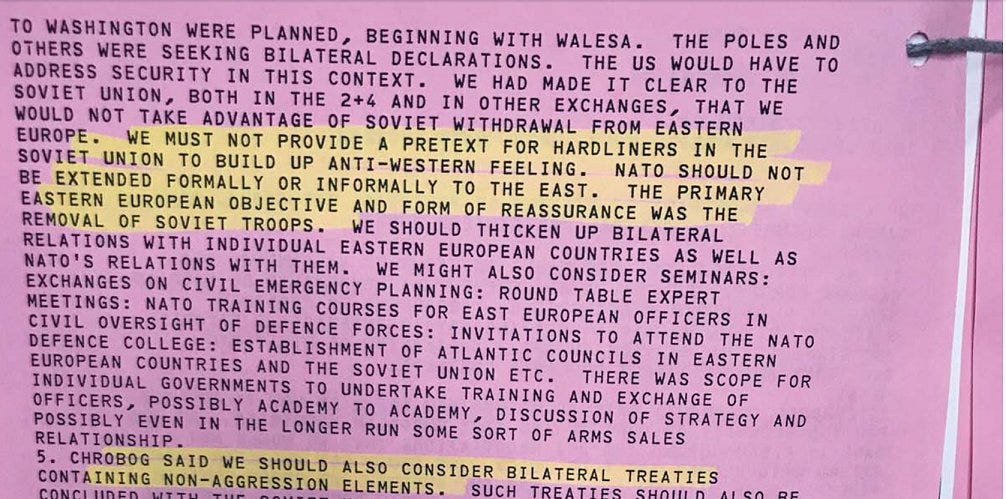
Verbatim [with emphasis added for the most salient points]:
“WE HAD MADE IT CLEAR TO THE SOVIET UNION, BOTH IN THE 2+4 AND IN OTHER EXCHANGES, THAT WE WOULD NOT TAKE ADVANTAGE OF SOVIET WITHDRAWAL FROM EASTERN EUROPE. WE MUST NOT PROVIDE A PRETEXT FOR HARDLINERS IN THE SOVIET UNION TO BUILD UP ANTI-WESTERN FEELING. NATO SHOULD NOT BE EXTENDED FORMALLY OR INFORMALLY TO THE EAST. THE PRIMARY EASTERN EUROPEAN OBJECTIVE AND FORM OF REASSURANCE WAS THE REMOVAL OF SOVIET TROOPS.”
As you can see, the promise was indeed made. The Soviet withdrawal did occur. Yet NATO expanded anyhow, including in Poland for which they had also explicitly stated they would not.
If NATO has lied about this broken promise, then how many others have they lied about and broken? And, more importantly, should they be trusted?
That is not the only promise NATO has broken with Russia.
The Minsk agreement of 2015
“The Minsk agreement, which the Russian government backed for diplomatic reasons, has served to allow Washington time to train, equip, and mobilize much stronger forces now preparing to resume the attack on Donetsk and Luhansk,” observed Dr. Paul Craig Roberts, former U.S. Assistant Secretary of the Treasury, former associate editor at The Wall Street Journal, and long time Russia connoisseur, back in 2015.
He was right.
What is the Minsk agreement?
Not to be confused with the 1991 agreement of the same name, the 2015 Minsk agreement was one that aimed to resolve the long-simmering conflict in eastern Ukraine.
The conflict was between pro-Russian separatists mostly from the Donetsk and Luhansk regions who were more ethnically Russian and the Ukrainian government.

Image source: Al Jazeera.
The following passage from Reuters describes the 2015 (Minsk II) agreement in a nutshell:
“Representatives of Russia, Ukraine, the Organisation for Security and Cooperation in Europe (OSCE) and the leaders of two pro-Russian separatist regions signed a 13-point agreement in February 2015 in Minsk. The leaders of France, Germany, Russia and Ukraine gathered there at the same time and issued a declaration of support for the deal.”
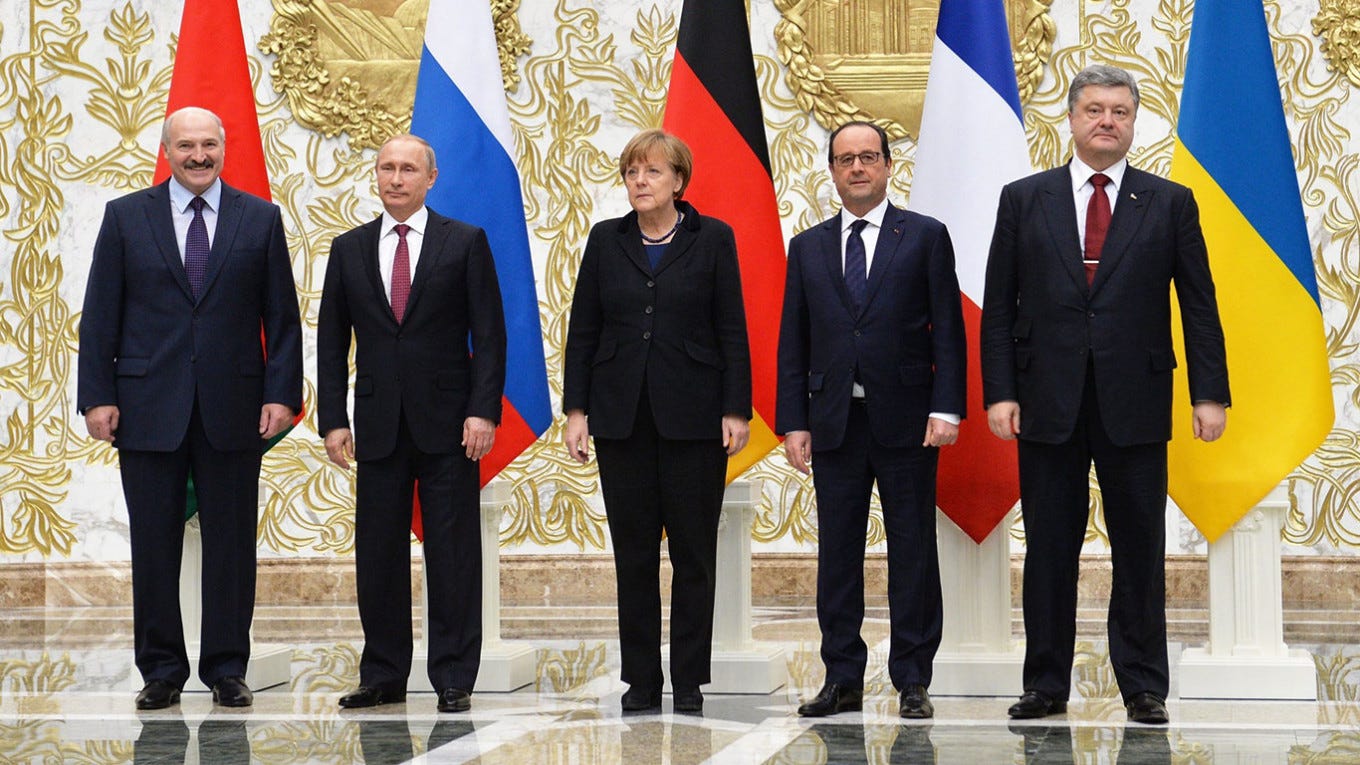
In February 2015, the Minsk II agreements were signed by Belarus’ Alexander Lukashenko, Russia’s Vladimir Putin, Germany’s Angela Merkel, France’s Francois Hollande and Ukraine’s Petro Poroshenko. Source: The Moscow Times.
The agreement ultimately failed.
While which side is the blame is a contentious matter, the Organisation for Security and Cooperation in Europe (OSCE), who was in charge of monitoring the implementation of the ceasefire agreement, determined that the Ukrainian government had repeatedly violated the agreement and around 200 weekly violations in 2016-2020 and more than 1,000 since 2021 occurred, according to Novaya Gazeta.
Though NATO stressed that the Minsk agreements remained “the best chance to settle the conflict,” its actions proved otherwise.
Back in 2015, Jens Stoltenberg, NATO’s Secretary General since 2014, indicated no less than an increase military support to the Ukraine during this so-called ceasefire period, stating “we have stepped up our support to Ukraine on command and control; logistics; cyber defence.”
And more specifically, in June of 2022, Stoltenberg affirmed NATO’s long-time push into Eastern Europe, stating:
“the reality is that we have also been preparing for this since 2014. Because that’s the reason why we have increased our presence in the eastern part of the Alliance, why NATO Allies have started to invest more in defence, and why we have increased the readiness.”
By “increase in the readiness”, Stoltenberg was referring to Russia. On the matter, Robert Bridge, an American writer and journalist for RT noted:
“What he neglected to mention, though, was the role Western powers played in the outbreak of civil violence in Kiev on February 24, 2014 that led to the Maidan coup and, ultimately, to the current situation. The US and its influence on the ground in Ukraine, channelled through “civil society” groups it bankrolled, was largely responsibility for that mess.”
A month before the Russian invasion in 2022, Ukraine’s own security chief, Oleksiy Danilov, warned the West against enforcing the Minsk II peace deal.
Danilov also denounced the Russian demands for NATO to bar Ukraine from ever joining the alliance.
Former opposition MP Ilya Kiva (who had to flee the Ukraine for his stark opposition to Zelenskyy) blamed the Ukrainian President of supporting pro-NATO policies causing the war, allowing Nazism to permeate in the country, and enslaving his own people in the eastern part of the country.
In a March 2022 interview Kiva slammed the U.S. and NATO for “using Ukraine as bait to provoke Russia into a conflict.” He added that Washington and its allies had tricked Zelenskyy which has led to its current state of devastation.
In concluding this section, the Minsk agreements were practically doomed from the start since powerful forces influencing Kyiv, including NATO and many others mentioned in this exposition, really had no sincere interest in helping to establish peace in eastern Ukraine; but were more concerned with continuing their eastward expansion towards Russia’s borders.
2. The Maidan Coup & Victoria Nuland’s “Fuck the EU”
After the dissolution of the Soviet Union in 1991, Ukraine became an independent country.
In the years 2013-2014, the Ukraine was at a real crossroads. Geographically-perched between Europe in the west and Russia in the east, alliances were split and there was a lot at stake – economically and geopolitically.
The West was calling for the young country to align itself with European and American interests.
But its President, democratically-elected Ukrainian President Viktor Yanukovych, was instead leaning towards aligning the country’s interests with Russia and Putin.
This was absolutely unacceptable to Western powers and NATO.
Consequently, Ukrainian President Viktor Yanukovych was overthrown in a violent coup on Feb. 21, 2014.
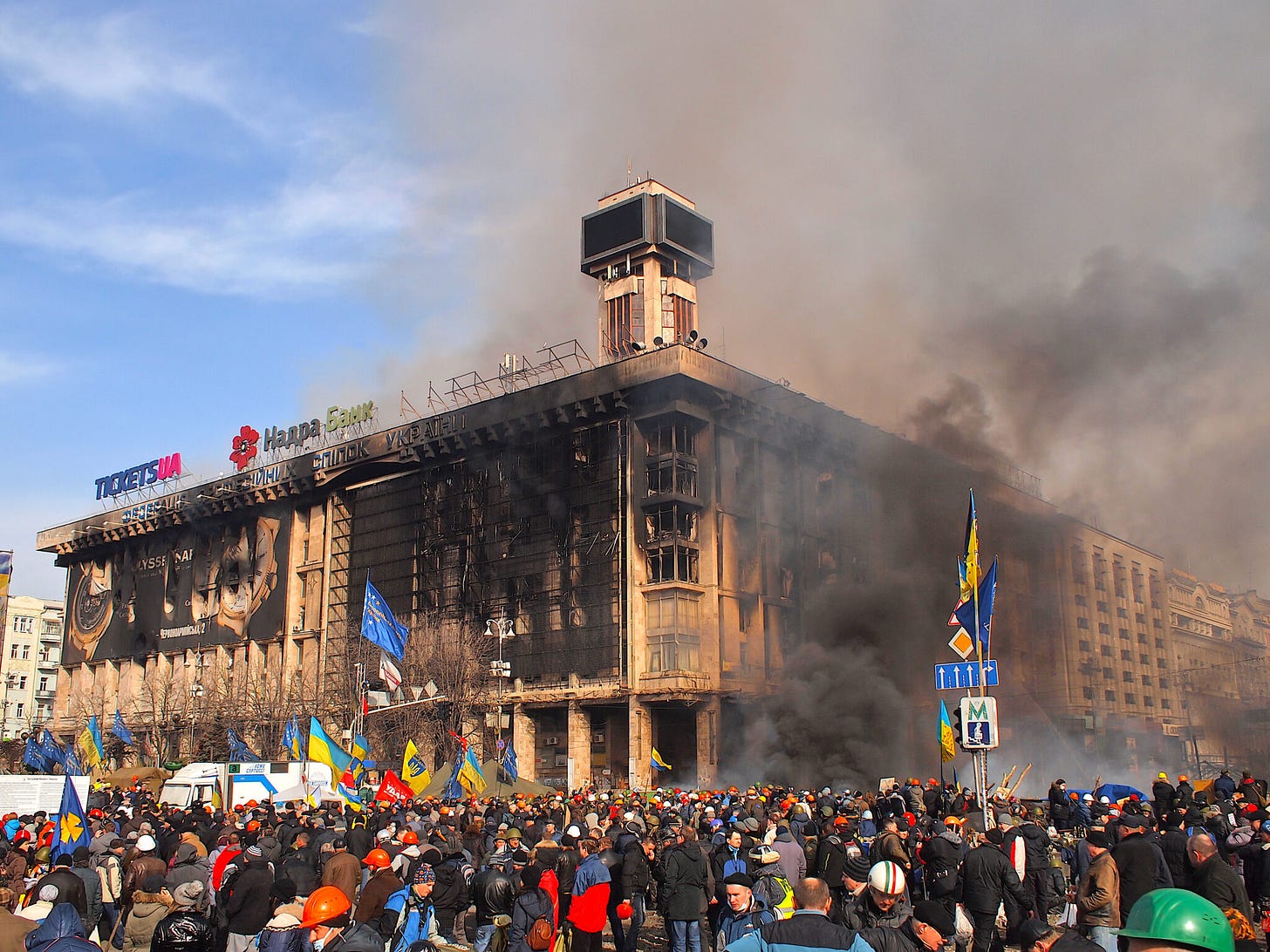
Violence during the Maidan coup in Ukraine, 2014. Source: Wikipedia.
This operation is more commonly known as the Maidan Coup in which demonstrators (against Yanukovych’s government) leadership were riddled with neo-Nazis.
A phone call (transcript here) was leaked to the news media on February 4th, 2014 between U.S. Assistant Secretary of State Victoria Nuland and Geoffrey Pyatt, the then U.S. ambassador to Ukraine.
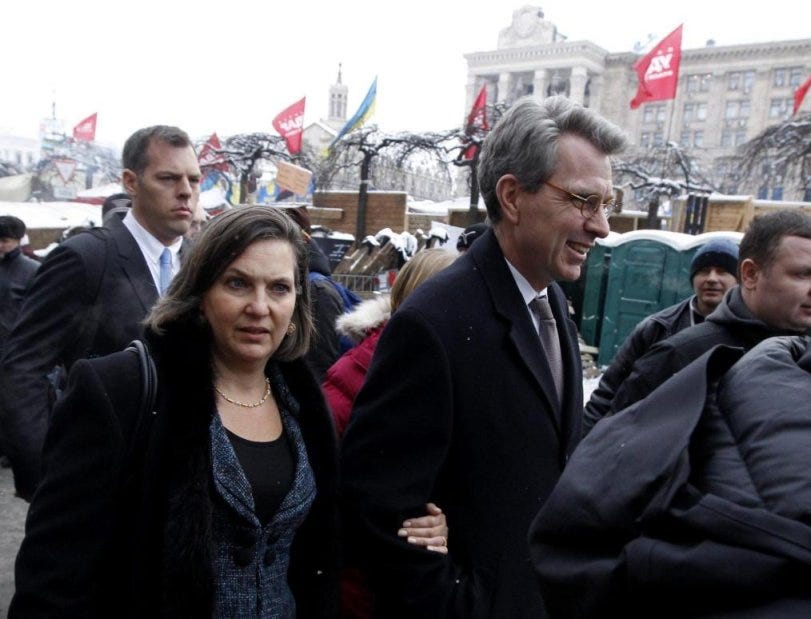
Assistant Secretary of State Victoria Nuland with Geoffrey Pyatt, February 6, 2014.
During the call, they discussed which puppets could be installed in their new government; keep in mind, this is a few weeks before the Maidan Coup had occurred.
Nuland and Pyatt schemed on how they would form the new government post-coup placing “Yats”, Arseniy Yatseniuk as a key plant for the new government.
Arseniy Yatseniuk became the new Prime Minister of Ukraine on February 27, 2014.
And in June of the same year, NATO- and Western-friendly Ukrainian oligarch Petro Poroshenko replaced Yanukovych as the new President of Ukraine in what was a very questionable election.
This phone call is also memorable for its “Fuck the EU” reference uttered by Victoria Nuland. This was in reference to her frustration about how members of the European Union were somewhat divided on relations with Russia and thus not aggressive enough against their Cold War rival.
3. Joe Biden bragging about how he got a Ukrainian prosecutor fired who was investigating an energy firm that had Hunter Biden on its board
According to Consortium News, after the U.S.-led coup, Viktor Shokin, Ukraine’s prosecutor general, was investigating corruption allegations about Burisma holdings, a Ukrainian oil & gas giant for which Hunter Biden had been given a lucrative membership to sit on its board of directors.
Threatening to pull a U.S. billion-dollar aid package to the Ukraine, then Vice-President Joe Biden forced Ukrainian President Poroshenko to fire Shokin.
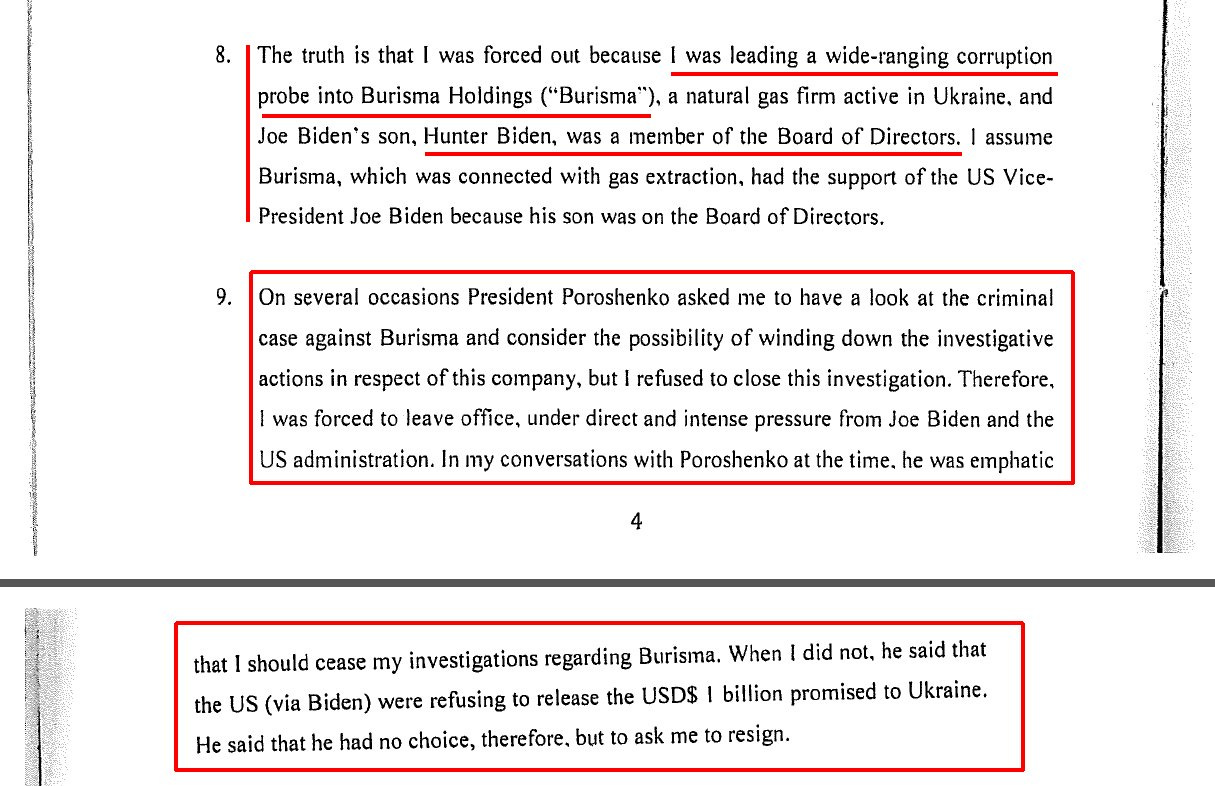
Screenshot of the Witness Statement (affidavit) from Viktor Shokin, who was investigating corruption at Burisma Holdings, confirming that Poroshenko fired him because of Joe Biden’s threat to pull the USD$1 billion package.
In January 2018, Biden openly bragged about this at the Council on Foreign Relations:
Alternative video link: https://rumble.com/vc5gnj-joe-biden-admits-quid-pro-quo-with-ukraine.html
Hunter Biden was paid handsomely, to the tune of $80,000 per month, despite having no experience whatsoever in the energy sector. It was thus presumed that he was on the board mostly because of his name and political ties, particularly with his father who was President Obama’s Vice-President at the time.
Though the mainstream press has largely exonerated Hunter Biden regarding his role and actions with Burisma, the New York Post did provide evidence which shows that Hunter had indeed introduced one of its board members to his Vice-President father.
The fact that Joe Biden leveraged the power of his V.P. position to avoid having an investigation into the firm for which his son was a board member represents a clear abuse of power and conflict of interest. Who knows what additional facts might have been revealed should the investigation have proceeded. The next section, however and nonetheless, provides damning evidence in this regard.
What’s more, this incident exemplifies the power and influence the U.S. Administration had over the President of Ukraine post the Maidan coup.
4. Biological Weapons Production Facilities
The corporate media has also largely ignored claims alleging the existence of biological weapons laboratories across the Ukraine.
In the month after Russian forces launched their invasion of Ukraine, Lieutenant General Igor Kirillov, commander of the Russian radiological, chemical and biological defense force, claimed that as many as 30 biological laboratories had been established in Ukraine that are actively cooperating with the US military; and that the Ukrainian authorities have been urgently destroying pathogens studied at its laboratories linked to the US Department of Defense.
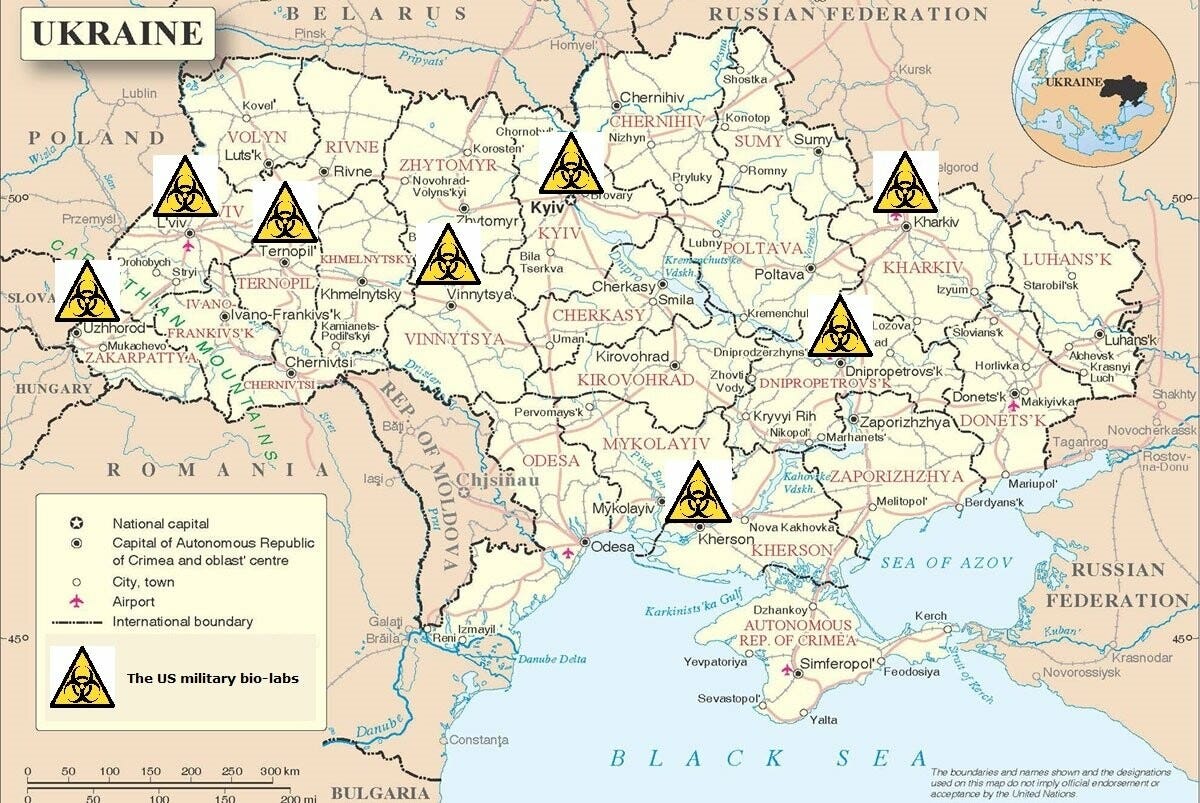
Map showing some biolabs in the Ukraine, image source: Polish Sputnik – Nowe doniesienia o amerykańskich projektach dotyczących broni biologicznej na Ukrainie (google translated: New reports on US bioweapons projects in Ukraine)
China also accused the U.S. military of operating such biolabs in the Ukraine which Bloomberg brushed off as a conspiracy theory.
On March 8, 2022, American ally Britain also downplayed the story alleging that they were fabricated to justify Russia’s invasion of the Ukraine.
Yet, hours later Victoria Nuland (the same mentioned above), acting as Undersecretary of State admitted that such facilities existed stating:
“Ukraine has biological research facilities which, in fact, we’re now quite concerned Russian troops, Russian forces may be seeking to gain control of, so we are working with the Ukrainians on how we can prevent any of those research materials from falling into the hands of Russian forces should they approach.”
And though the U.S. State Department two days later denied any involvement in their operations, evidence suggests otherwise.
On the subject Glenn Greenwald outlined the extent to which the legacy media were in full damage-control, labelling all those reporting on the matter as crazy conspiracy theorists and peddlers of misinformation. Greenwald began his piece with [original links included]:
“Self-anointed “fact-checkers” in the U.S. corporate press have spent two weeks mocking as disinformation and a false conspiracy theory the claim that Ukraine has biological weapons labs, either alone or with U.S. support. They never presented any evidence for their ruling — how could they possibly know? and how could they prove the negative? — but nonetheless they invoked their characteristically authoritative, above-it-all tone of self-assurance and self-arrogated right to decree the truth and label such claims false.”
Greenwald reiterated the fact that Nuland had indeed never denied the existence of the labs and, in fact, was quite worried about how their materials could “fall into the hands of Russian forces,” to which he posited some highly relevant questions [emphasis added]:
“What is in those Ukrainian biological labs that make them so worrisome and dangerous? And has Ukraine, not exactly known for being a great power with advanced biological research, had the assistance of any other countries in developing those dangerous substances? Is American assistance confined to what Nuland described at the hearing — “working with the Ukrainians on how they can prevent any of those research materials from falling into the hands of Russian forces” — or did the U.S. assistance extend to the construction and development of the “biological research facilities” themselves?”
Greenwald also points out how the U.S. State Department downplays its role with the biolabs in the Ukraine, stating that they are merely for research purposes and for reducing biological threats. Yet, fact sheets on their website demonstrate millions in funding and for the specific purpose of building facilities and providing training.
Ukraine Biolab Funding via Hunter Biden’s entities
A bombshell report by the U.K.’s DailyMail provides ample evidence that corporate entities related to Hunter Biden have funded biolabs in the Ukraine. And, in this respect, there is even a connection to the aforementioned Burisma Holdings.
As per the DailyMail’s March 25, 2022 article title ‘EXCLUSIVE: Hunter Biden DID help secure millions in funding for US contractor in Ukraine specializing in deadly pathogen research, laptop emails reveal, raising more questions about the disgraced son of then vice president’, we find a treasure trove of emails and documents that provide solid evidence of funding activities for these bioweapons lab in the Ukraine.
The article begins with a mention of a U.S. Department of Defence (DoD) contractor called Metabiota which specialises in researching pandemic-causing diseases that could be used as bioweapons. Sound familiar?
So, it appears that the previously mentioned claims by the Russian General that biological laboratories had been established in Ukraine and are actively cooperating with the US military certainly appears to be founded in reality, rather than some tall conspiracy tale.
The Russian Commander also claimed that their funding arose from the current U.S. leadership; and, in particular, from the investment fund Rosemont Seneca which is headed by none other than Hunter Biden.
As per a November 14, 2019 ZeroHedge article, Rosemont Seneca is a corporation controlled by Hunter Biden and his business partner Devon Archer. And Rosemont Capital is the parent company of Rosemont Seneca (also sometimes referred to as Rosemont Seneca Technology Partners, or RSTP).
Amidst a U.S. Department of Justice investigation into Hunter Biden’s foreign dealings, even Wikipedia had to do damage control to memory-hole Hunter’s links to Rosemont Seneca.
Here is the Burisma link. Through the Biden emails, it was revealed that Burisma executive Vadym Pozharskyi had sent a thank you email to Hunter for having invited him to [Washington] DC to meet his father, Joe Biden. This corroborates the rationale that Hunter’s presence on Burisma’s board of directors was indeed for his family name and political connections.
Next, the DailyMail leak reveal an email from Vadym Pozharskyi to Devon Archer, Hunter’s business partner at Rosemont Seneca, on the subject of “Ukraine Science.” In the email letter, Pozharskyi expresses his concern about how Metabiota, the DoD subcontractor, seems to have pulled their financing for this “science” project, i.e., biolabs.
At prima facie, an inquiring mind would ponder the reason on why Burisma, a company involved in oil & gas, would be concerned with funding for biolab facilities; for, this would obviously not fall under the scope and nature of the principal activities of an energy company. Unless, of course, this was not the raison d’être for this company in the first place.
Perhaps funding was pulled due to closer scrutiny on these entities, along with the U.S. Department of Justice’s investigation.
Also according to the DailyMail leak, Hunter and his colleagues invested $500,000 in Metabiota through their firm Rosemont Seneca Technology Partners and they raised several million dollars of funding for the company from investment giants including Goldman Sachs.
According to a ZeroHedge article about the same Hunter Biden email leaks, Metabiota was working under Black & Veatch – a US defense contractor tied to US intelligence, which built the Ukraine labs that analyzed bioweapons and deadly diseases.
Black & Veath does appear on some of the aforementioned fact sheets of the U.S. Embassy in Ukraine website, namely: Kherson Diagnostic Laboratory, Ternopil Diagnostic Laboratory, Zakarpartska Diagnostic Laboratory, Lviv Research Institute of Epidemiology and Hygiene, Lviv Diagnostic Laboratory, Kharkiv Diagnostic Laboratory, State Regional Laboratory of Veterinary Medicine Luhansk Regional Diagnostic Veterinary Laboratory, Dnipropetrovsk Diagnostic Laboratory, and Vinnytsia Diagnostic Laboratory.
It is also worth noting that, according to the Kharkiv Diagnostic Laboratory factsheet, a special permit for working with pathogens (i.e., potentially dangerous bioweapons) was issued and Kharkiv, where the Kharkiv Diagnostic Laboratory is located, is only 25 kilometers from the Russian border. This would definitely be cause for concern by the Russian forces, for fear of leak – intentional or not – emanating from this particular facility. The same can be said about the Black & Veath facility in Luhansk which sits dangerously close to the Russian border.
Also regarding Metabiota, the DailyMail article noted [emphasis added]:
“Metabiota also has close ties to the Wuhan Institute of Virology (WIV), suspected to be the source of the COVID-19 outbreak.
WIV was a hotspot for controversial ‘gain of function’ research that can create super-strength viruses.
Chinese scientists performed gain of function research on coronaviruses at the WIV, working alongside a US-backed organization EcoHealth Alliance that has since drawn intense scrutiny over its coronavirus research since the COVID-19 pandemic.
Researchers from the Wuhan institute, Metabiota and EcoHealth Alliance published a study together in 2014 on infectious diseases from bats in China, which notes that tests were performed at the WIV.
Shi Zhengli, the WIV Director of the Center for Emerging Infectious Diseases who became dubbed the ‘bat lady’ for her central role in bat coronavirus research at the lab, was a contributor to the paper.
Metabiota has been an official partner of EcoHealth Alliance since 2014, according to its website.”
As for the last claim from the above quote, a simple search on the matter corroborates linkages between EcoHealth Alliance and Metabiota.
Moreover, it has been confirmed that EcoHealth Alliance has indeed been funded to do gain of function research (for deadly pathogens such as SARS-CoV-2).
As this author had noted in the ‘The origins of SARS-CoV-2 (Covid-19)’ section of a previous exposé, it is very possible, and even likely, that SARS-CoV-2 originated from the Wuhan Institute of Virology.
Accordingly, the potential threat of a new pathogen emerging from even one of these facilities in the Ukraine is undoubtedly of paramount concern to the Russians, as it would be with any country.
Finally, it remains unclear as to how the Ukraine benefits from having such biolab facilities, for it inherently poses risks such as accidental leaks as well as possible retaliatory actions by nervous neighbors.
Continue reading at Dan’s Substack HERE
As a proud Canadian, Dan is a freelance investigative journalist. The areas he is focusing on include: Financial Markets & Cryptos, Geopolitics, and Canadian affairs. He currently lives in the beautiful Eastern Townships in Quebec province.
Top image caption and credit: Graffiti “Stop War” on Russia’s war in Ukraine in the Mauerpark in Berlin, Germany. Image taken on March 11, 2022. Source: Wikimedia Commons.
Become a Patron!
Or support us at SubscribeStar
Donate cryptocurrency HERE
Subscribe to Activist Post for truth, peace, and freedom news. Follow us on SoMee, Telegram, HIVE, Flote, Minds, MeWe, Twitter, Gab, What Really Happened and GETTR.
Provide, Protect and Profit from what’s coming! Get a free issue of Counter Markets today.

I find this expose of American and Western conspiracies to destroy Russia to be disgusting and arrogant beyond belief. These wretched entities are quite willing to use Ukraine and the Ukrainian people as sacrificial lambs sent to the slaughter for American imperial designs. It is horrific and shows the evil that permeates the US from the top down. The US is cruising for a terrible bruising and such a downfall will be orchestrated and carried out by Washington in all its bloody glory!